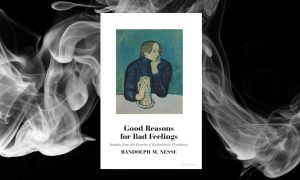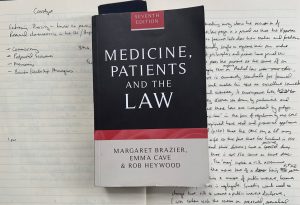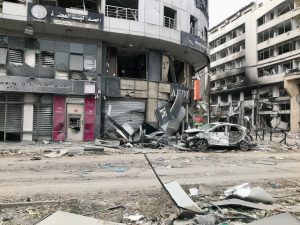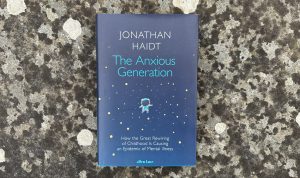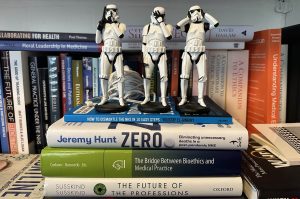How has increasing workload impacted on GPs, and our sense of providing safe care to our patients? Nada Khan finds that research into workload and safety suggests an association between wellbeing, burnout and patient safety.
Effective public health campaigns need more than posters and TV ads about going to see your GP. We need to get key community influencers in the team if we are going to have any impact whatsoever. John Havard argues that barbers have
The intervention takes less than a minute every day - and done at scale would be safe and as cheap as chips. Imagine that existing good quality evidence showed that it is 10 times more effective than the current NHS Health Check
I don’t need to tell a GP audience this, but it’s always worth a reminder. For us GPs the relationship is everything. Outside GPs this doesn’t seem widely understood. Everyone will agree that relationships are crucial, but usually in a way that
In 'Good Reasons for Bad Feelings', Randolph M. Nesse offers a fresh perspective on anxiety and depression in modern day living – that of evolutionary medicine, specifically evolutionary psychiatry.
Plans to include PAs in general practice have been recently challenged with a recent Royal College of General Practitioners’ (RCGP) call to halt additional recruitment and deployment of physician associates. The RCGP position is based on results from a recent survey of
As AI tools become increasingly sophisticated and accessible, it is important for GPs to engage with this technology, argues Marcus Lewis
In Japan, there is a saying that deities disguise themselves as difficulties and offer trials to those who have true courage and strength. My supervisors taught me that when we are overwhelmed and troubled by complex problems, we should respond with sincerity
Not helpful but harmful: Competence expansion alone increases, rather than decreases, burnout in GPs
Competence expansion alone is not a viable solution to intolerable GP workloads in the UK or anywhere else. Richard Armitage has a simple message for policymakers on the mathematics of practitioner burnout.
Stories entertain us, but on a deeper level, they also help us make sense of our experience; they are cultural vectors, transmitting the values and wisdom of one generation to the next. The proper use of power is a common theme in
The recruitment and retention ‘crisis’ in general practice is far from being resolved, and it risks being seriously exacerbated by a lack of jobs in general practice.
Critical realism offers a theoretical framework that reflects what wise clinicians instinctively know: medical disorders do not always arise as single events at molecular or cellular level but can be generated at one, or multiple levels, of complexity through numerous contributory factors:
David Kernick explores two models that offer insights into the concept of healing, here taken as a facilitation of the body's intrinsic ability to restore optimum functioning: allostatic control and complex adaptive systems.
Most jobs now involve a screen and being online. "What does this new reality do our minds and brains?" is a question yet to have enough evidence to answer. However it is fast becoming clear that we are no happier or healthier
The idea of history repeating is historically recurrent. It goes back to the ancients, so there must be something in it. A case in point is the UK’s recent infected blood scandal ...
Andrew Papanikitas reviews and reflects on a good critical sourcebook on the law for GP trainers and trainees looking to flesh out a case-based discussion or tutorial, as well as for the GP looking for reading in response to a patient unmet
Against a backdrop of armed conflict and geo-political instability, medical education becomes a daunting challenge. Safiya Virji highlights a web-based resource which can be used offline.
“Medicine is a social science, and politics nothing but medicine at a larger scale." Mavin Kashyap invites us to think politics as a UK General election gets closer.
In a time of unprecedented pressure on health professionals, especially on GPs, how do we hang onto the magic ingredients that make those brief consultations count? A poem in answer.
Reducing medicine wastage requires a concerted effort from all stakeholders, and yields returns in terms of finance, well-being and the environment. Vasumathy Sivarajasingam explains.
There has long been a tendency for “Othering” certain general practitioner groups. Paula Wright unpacks the phenomenon.
Edin Lakasing and Shalinee Patel believe that this system offers poor value for public money, will needlessly increase practice workload, and risks having a corrosive effect on the trust fundamental to the relationship between healthcare workers and families.
So my big reveal was that I was a doctor. That is to say a human being who'd been to medical school and was employed in delivering healthcare, not someone who'd been born with supernatural skills to look into other people's souls
I think in the past I might have sneered at the idea of spending a few hours with performing artists when we had a busy job to get on with, and a never-ending to-do list to work through. But just ploughing on
David Law offers a positive experience of physician associate deployment at his practice, including how the practice accommodated the need for supervision.
Kindness is a disposition that can’t be policed and which grows out of care, attention and connection. To suggest it can be enforced and regulated for is a mistake, explain Rupal Shah and colleagues.
General practice plays a particularly important role in people's lives, supporting the health, livelihoods and lifestyles of individuals and communities. To fulfil this role effectively, GPs must embrace the idea that experience and learning are never wasted.
The Prescribing lifestyle medicine mental health and trauma course was something I cautiously signed up for... Upon arrival, I was amazed at the gathering of surgeons, GPs and nurses alike, ready to hear Dr Gabor Maté , hosted by Dr Ranjan Chatterjee,
Our distinct expertise in advanced generalist medicine, together with our extended experience in the community healthcare context, defines the expertise that we bring to a consultation process, argues Joanne Reeve.
We have a professional obligation to keep up to date, and our patients will hopefully take it as read that we know what we are doing. They are more likely to thank us, though, for also having taken the trouble to walk
The Anxious Generation: How the Great Rewiring of Childhood Is Causing an Epidemic of Mental Illness
The Anxious Generation documents a phenomenon which almost certainly has been recognised, tracked and pondered by all practicing GPs, whose workload consists of a substantial and growing prevalence of anxiety and depression, particularly among younger patients.
Making explicit the roles and activity of the General Practitioner has many benefits. It enables others to recognise, value and utilise our work. The acronym is GENERALISM!
Hannah Milton reflects on the neuroscience of trauma and Adverse Childhood Experiences (ACEs) and how this can lead to what is termed ‘latent vulnerability’.
The power of placebos is both a manual and a manifesto. It both a guide to the ethical use of placebos in healthcare, as well as placebos as a window into empathic, meaningful healthcare.
What are 'Ordinary' worries? Elke Hausmann reflects in the light of recent announcements by the prime minister about taking sick note prescribing away from GPs, with the argument that 'normal worries' are being wrongly medicalised as mental illness, also using that to
To be fit for work, a person must be capable of more than simply carrying out in isolation the tasks required by their role: they must be able to do so repeatedly, to a consistent standard, and in a way that represents
GPs are in the firing line of efforts to reduce sickness certification. The UK government suggest that the responsibility for issuing fit notes could be moved from GPs to specialist occupational health professionals. Nada Khan unpacks the issues.
Elke Hausmann recommends Lynn Payer's book to anyone who wants to understand the history of many of the underlying assumptions shaping medicine and our practice of it -the inevitable result of medical progress but of choices, conscious or not, that arise from
...an apparent paradox makes science possible. At least two conditions are necessary, and they appear deeply contradictory. The first is that the universe must be governed by consistent physical laws, the second is that humans in general, and scientists in particular, must
Thomas Oswald questions the speed with which physician assistants have been rolled out in primary care as a GP-alternative, and wonders why the high profile debates chiefly involve the RCP rather than the RCGP.





